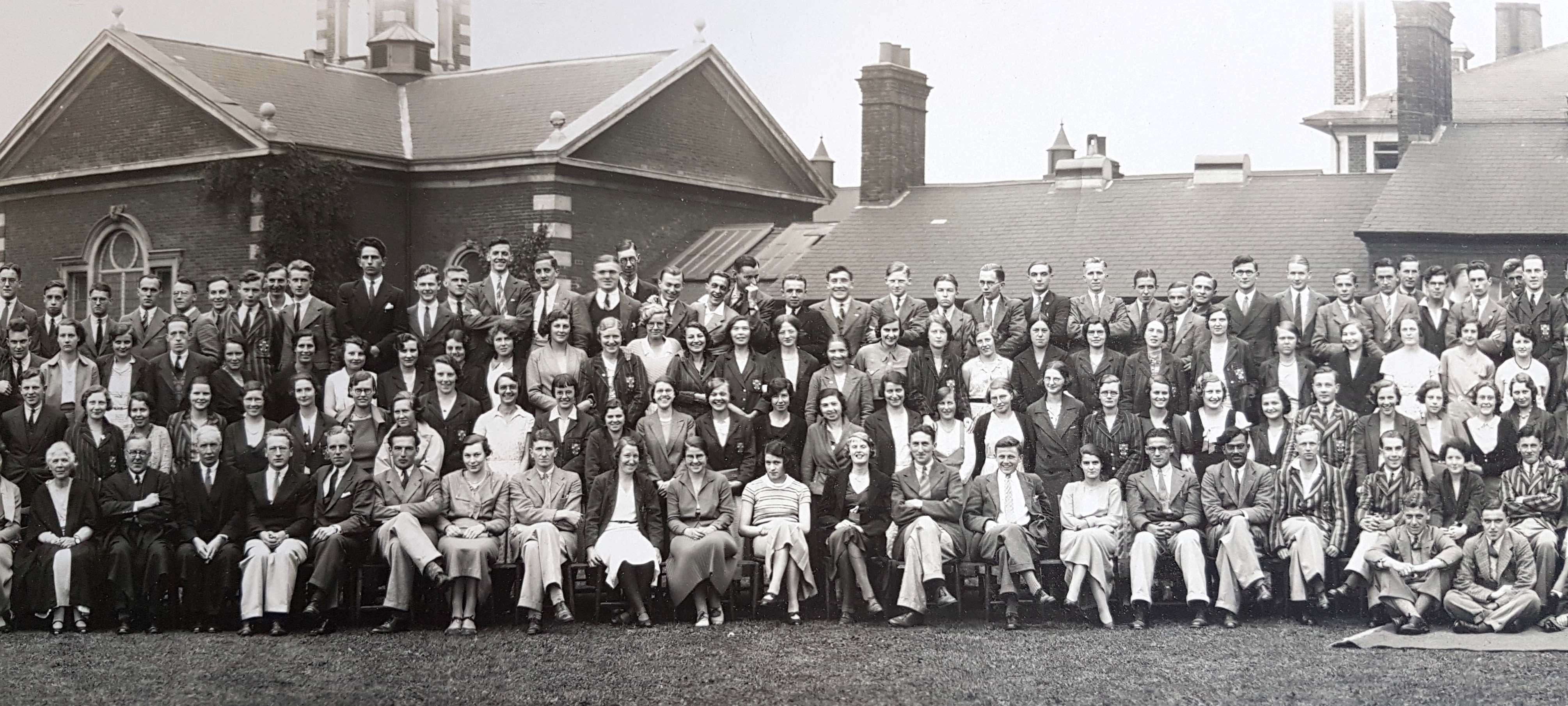
Shiba Chatterjee seated front row fifth from the right- the only non-white and overseas student at Goldsmiths’ College in 1932-33. Image: Goldsmiths Archives.
Shiba Prasad Chatterjee was the only Indian student at Goldsmiths’ College in 1933.
He was studying for a one year teaching certificate in a society that was deeply racist and in a country that was Imperialist and refusing to grant his own people either home rule or independence.
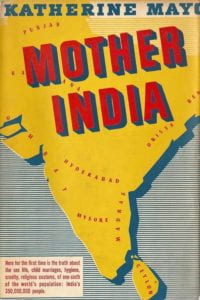
The cover of the first edition of Katherine Mayo’s ‘Mother India’ first published in USA in 1927 and Great Britain in 1928 and which purported to reveal ‘for the first time […] the truth about the sex life, child marriages, hygiene, cruelty, religious customs, of one-sixth of the world’s population: India’s 350,000,000 people.’
It was a best seller, widely quoted and the authority and talisman for all those British Imperialists who believed that Indians were not capable and fit to run their own affairs.
That was the majority of the Great British population, the position of most of the British press and leading and influential politicians such as Winston Churchill.
There had even been a United Empire Party spawned and sponsored by the most powerful newspaper barons, Lords Beaverbook and Rothermere, that sought to break into British mainstream politics.
It had been defeated in 1931 when the Prime Minister of the National Government, Stanley Baldwin, condemned the press barons for wanting: ‘power without responsibility – the prerogative of the harlot throughout the ages,’ using their newspapers as ‘engines of propaganda for the constantly changing policies, desires, personal wishes, personal likes and dislikes,’ and distorting the fortunes of national leaders ‘without being willing to bear their burdens.’
At the same time the leader of the Indian Congress movement seeking self-determination for 350 million Indians, Mahatma Mohandas Gandhi, had been jailed for the eighth time.
The official student record for Mr. Chatterjee contains very limited though impressive information about his background.
He was born in March 1903 and came to Goldsmiths with a Master of Science degree in Geology from the University of Benares in India.
At the age of 29, he was therefore much older than the other British students attending the college.
While studying at the College he lodged with a Mrs Fenlon at 37 Breakspears Road in Brockley, SE4.
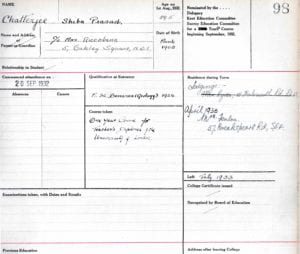
Shiba Chatterjee’s student record. Image: Goldsmiths Archives.
Houses in this conservation area are currently valued at nearly £1 million with two bedroom flats often selling for around £500,000.
He was sponsored during his stay in London by a Mrs Riccobena of 5 Oakley Square N.W.1.
He gained his teaching certificate recognised by the British Board of Education in July 1933.
Nothing more is known about him. In the only other College archive document his presence on the one year teaching certificate is indicated not in type-written script, but by pencilled handwriting.
It is as though the recording of his presence was something of an afterthought.
The traces of Shiba Chatterjee’s existence in the College records may be very slight, but the power and presence of his political and cultural identity is on a giant scale with an article he wrote for the Goldsmiths’ magazine Smiths in the year of his graduation.
The article titled ‘To My English Friends’ represents one of the most heartfelt and dignified appeals for political and cultural understanding it would be possible to find throughout all the archives held at Goldsmiths.
It has the compassion, courtesy, and imperative of Mahatma Gandhi, of whom he was undoubtedly a follower and admirer.
To My English Friends
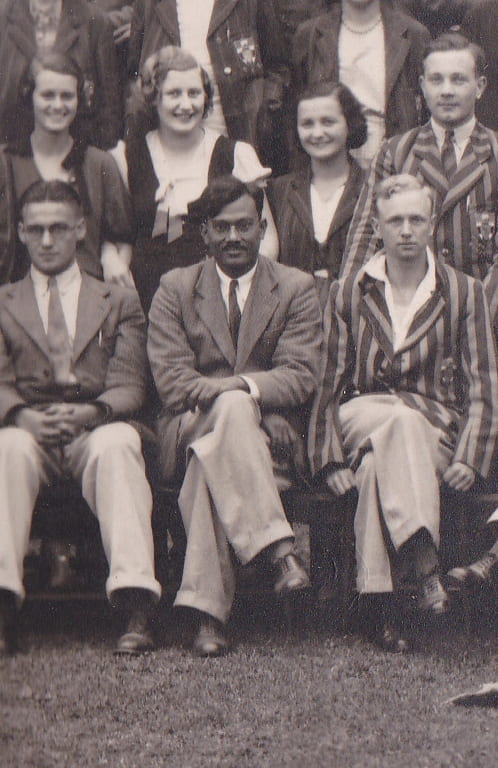
The only known picture of Shiba Chatterjee, bespectacled, studious, and older than his contemporaries (He was 29) wearing the Oxford bags fashionable at that time, but not the striped College blazer so sportingly worn by the European students around him. Image: Goldsmiths Archives.
‘India has many problems to-day touching every phase of life, and her best brains are actively engaged in solving them. India is fully conscious that her contribution in the modern age to humanity is long overdue, and is directing her whole energy and resources to enable her children to stand as equals alongside other nations of the world with a view to making original contribution befitting her past traditions. India had a glorious past. Indian civilisation and culture are not to be unearthed as prehistoric fossils. They are still throbbing with life. India gave birth to two world religions- Hinduism and Buddhism, and it is claimed Muhammed, the prophet, founder of the Islamic religion had his inspiration from the Indian savants of that age. India is essentially a religious country, religion is her life blood. Millions of souls belonging to different countries such as China and Japan, Burma and Siam, Tibet and Ceylon look to India as their spiritual home. Without deprecating in the least the wonderful work done by the Christian missionaries in my country, the Indian takes it to be an irony of fate when he sees a Christian missionary engaged in proselytising work in India showing “light to the heathens.”
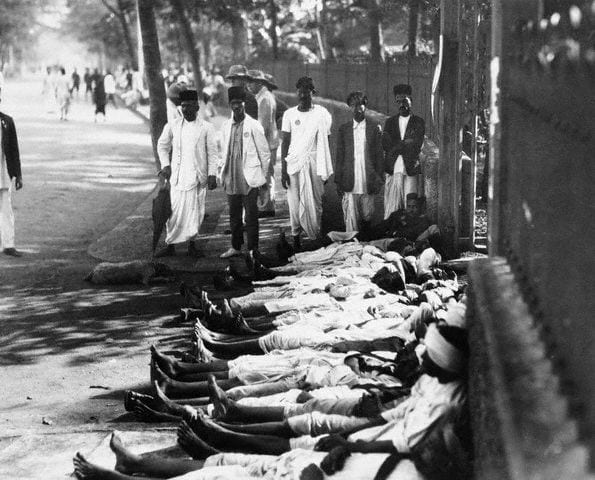
Workshop strikers preventing people from entering and leaving their place of work in support of The Indian National Congress movement led by Mahatma Gandhi that sought independence from British rule in 1930. Public Domain.
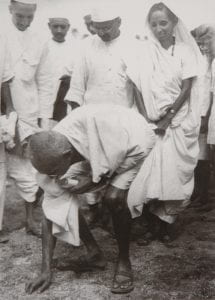
Gandhi at Dandi, South Gujarat, picking salt on the beach at the end of the Salt March, 5 April 1930. Behind him is his second son Manilal Gandhi and Mithuben Petit. Image: Public domain.
“An unsympathetic critic may find fault everywhere in India. If he is an important personage he will rush down to Calcutta, the commercial capital, from Bombay, the main gateway by the imperial mail train, thereby covering a distance of more than one thousand miles in about twenty-four hours time, his quick brain all the time analysing and storing up with what glimpses of the Indian life through a carriage-window of the moving train his powerful eyes catch; he will stay for about a week at Calcutta in a palace as the guest of the Governor of the Province of Bengal, attend a dance and race course; then he will proceed to Delhi, the political capital of India by the fastest train, through the densest part of India, will stay another week at Delhi in the viceregal palace and will keep himself engaged in the same sort of activities. He will, of course, not forget to visit some Indian states where he will be entertained by Rajas and Maharajas, Nawabs and Chiefs, and will take part in shooting the wild animals, tigers and elephants, bears and lions and hordes of others.
He need not stay in India for more than a month, as by this time he will gain sufficient knowledge of a country inhabited by 350,000,000 souls, and in size as big as Europe minus Russia; and then, when he reaches home he invariably comes out with a book indicting the whole Indian people and justifying their perpetual subjections. What a tremendous wave of indignation swept over the length and breadth of our country on the recent publication of a sensational book about India !”
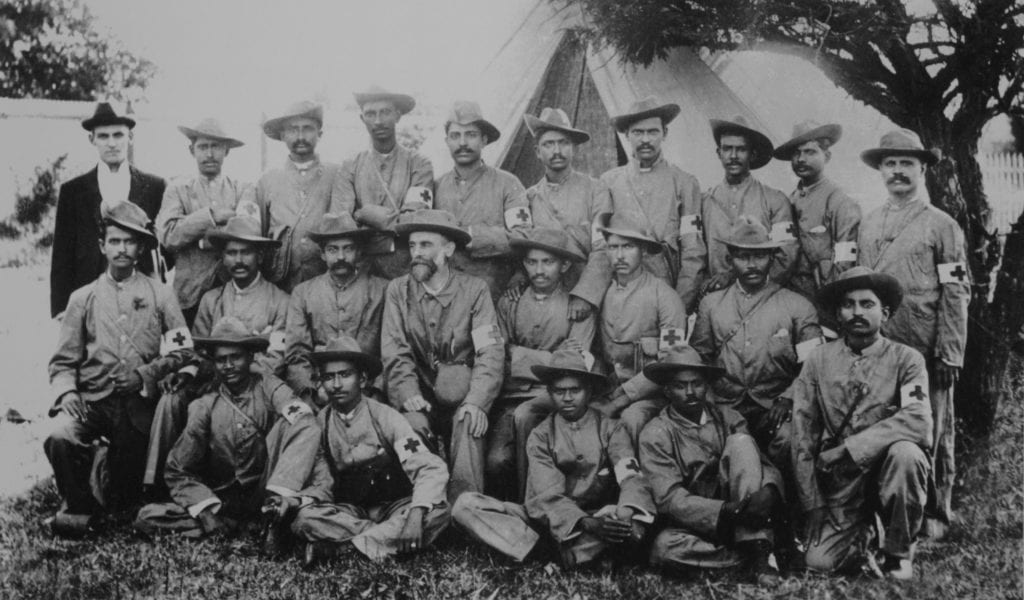
Gandhi, front row, far right with the stretcher-bearers of the Indian Ambulance Corps during the Boer War. During the same conflict the first Warden of Goldsmiths’ College, William Loring was a decorated soldier with The Scottish Horse Regiment. Image Public Domain.
“Mahatma Gandhi characterised it as a “drain inspector’s report.” When a powerful writer abuses his power the result is disastrous for the whole of mankind; his writings have a tremendous effect on the minds of the intelligentsia of his country, and it is how one nation begins to hate another, establishing the truth of the statement, “The nation we hate is the nation we know not.” To illuminate my point I may be pardoned if I refer to an incident which may be shocking to my friends here, to know. The English men and women at one time were made to believe that the French were no better than apes, and when the French prisoners from the Napoleonic wars were taken in the streets of London, some of the onlookers had seriously lifted the greatcoats of the French soldiers from behind to discover their tails. No further comment is necessary.
The world is changing. The interdependence of nations is increasing rapidly and the international co-operation is the need of the day. The progressive thinkers have realised that the national freedom is the indispensable pre-requisite of international co-operation. India is struggling to win her birth-right and paradoxical as it may sound, the oppressed do not bear any ill-feeling towards the oppressor due to the religious mentality of the masses, which is awakened after ageing stupor by the magical wand of Mahatma Gandhi, the politico-religious leader of India. India needs sympathy from other nations politically advanced, and entreats them, specially English women and men of the present generation, to keep an open mind and not to be influenced by the writings and speeches of the unsympathetic critics.”
S.P. CHATTERJEE
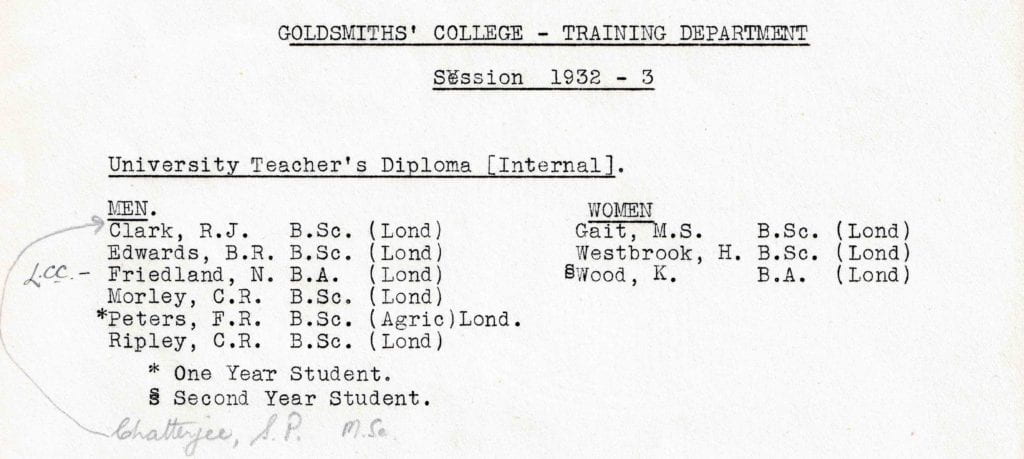
Shiba Chatterjee’s brilliant denunciation of Katherine Mayo’s book exposed the shallowness of an alleged expert presuming to write with authority on the basis of holiday or vacation knowledge of India that she had experienced through the lens of the rich and powerful.
In reality, it seems probable she was fed large amounts of slanted data and information by British Indian propagandists.
Gandhi had actually said of her book that:
‘… it is the report of a drain inspector sent out with the one purpose of opening and examining the drains of the country to be reported upon, or to give a graphic description of the stench exuded by the opened drains. If Miss Mayo had confessed that she had come to India merely to open out and examine the drains of India, there would perhaps be little to complain about her compilation. But she declared her abominable and patently wrong conclusion with a certain amount of triumph: “the drains are India.”‘
In 1933 the British media distorted and suppressed the true picture of the growing independence movement in India.
In the news-reel cinemas, people in Britain would be told of the first telephone connected service between London and India in patrician terms. It was not the world that had gotten smaller, but the British Empire in the short Pathé report “Hello India!” All European voices and faces are present, and not an Indian individual in sight or sound.
In reality India was a country of protest, resistance and agitation.
There had been extensive prosecutions of Communists for treason.
Choudhary Rahmat Ali published his pamphlet in 1933 advocating a state of ‘Pakistan’ in the Indus Valley, with other names given to Muslim-majority areas elsewhere in India.
This would be taken up by Muhammad Ali Jinha’s All-India Muslim League and become a foundation for the future establishment of the Muslim state of Pakistan.
The British colonial authorities had used the police to shut down an Indian National Congress meeting in Calcutta.
On the 8th May 1933, Mahatma Gandhi had begun a three week hunger strike because of the mistreatment of the lower castes.
On the 1st August, just days after Mr Chatterjee’s graduation, Gandhi had been re-arrested again.
But wherever Shiba Chatterjee and his Indian compatriots in London looked, there would be the ever-present distortion of mainstream media for the purposes of imperialist propaganda.
Pathé short filmic representation of ‘The Country That Is India’ in 1933 was simply another manifestation of the pro-imperialist, Indophobic and racist prejudices contained in Mayo’s ‘drain-inspector’s’ colonialist tract:
86 years later, the integrity and grace of Shiba Chatterjee’s generous address to his English friends at Goldsmiths’ College deserves amplification, recognition and respect.
He may have had sympathetic and supportive friends among his fellow students.
An edition of the College magazine 1931 contains an account from three trainee teachers who decided to accompany Ghandi on his early morning walks in the East End when he was in Britain for talks on home-rule.
But the historical truth about University of London, Goldsmiths’ College during the 1930s is that it was a higher educational institution that perpetuated and served the racist and colonial purposes of the British Empire.
Many students were trained to pursue teaching careers in colonies that subjugated, exploited and denigrated the human rights of people throughout the world.
It also needs to be acknowledged that recent historical investigation has highlighted evidence that during the twenty one years of Gandhi’s time in South Africa in the midst of British imperialism and colonialism he was corrupted by and contaminated with hierarchical racism in his recorded attitudes to Africans.
The South African academics Ashwin Desai and Goolam Vahed in the award-winning 2015 study The South African Gandhi Stretcher-Bearer of Empire, published by Stanford University Press, argued that Gandhi ‘throughout his stay on African soil, stayed true to Empire while showing a disdain for Africans. For Gandhi, whites and Indians were bonded by an Aryan bloodline that had no place for the African. Gandhi’s racism was matched by his class prejudice towards the Indian indentured.’
Shiba Prasad Chatterjee was a highly educated Indian scholar, writer and independent thinker who, on his own expense, travelled thousands of miles from his home in India to study in New Cross and acquire a British professional teaching qualification.
Perhaps he gave back to the College and British society much more than he was ever given. He left a message for future generations that is as valid and enduring now as it was in 1933:
“The world is changing. The interdependence of nations is increasing rapidly and the international co-operation is the need of the day.”
Forthcoming ‘That’s So Goldsmiths’- an investigative history of Goldsmiths, University of London by Professor Tim Crook.